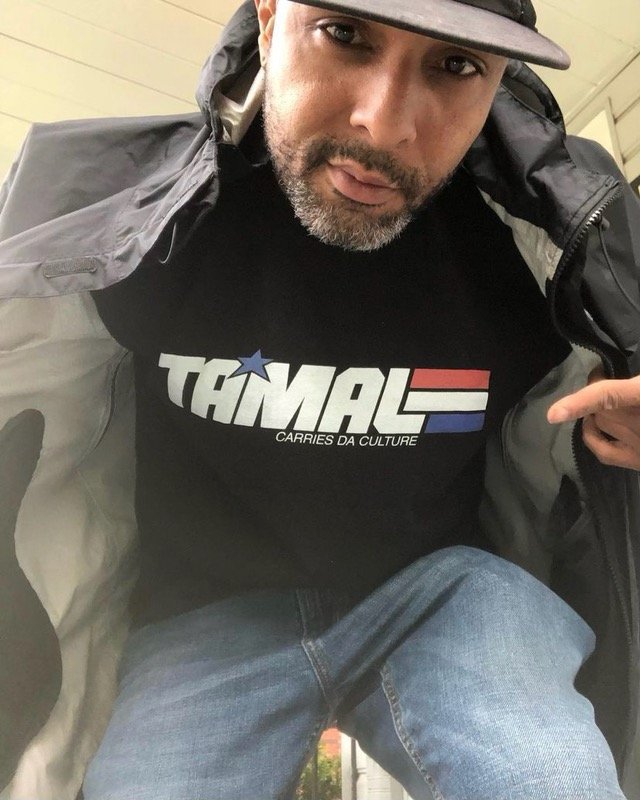Fundamentals of Hip Hop Culture
BY TAMAL OF @CARRYINGTHECULTURE
Hip Hop Historian and Journalist, Tamal of Carrying The Culture weighs in on the fundamentals of Hip Hop Culture.
Hip Hop became a huge part of my life in 1982. As a young 6 year old, when I first saw b-boys go off to “Planet Rock” from Afrika Bambaataa and Soul Sonic Force, I knew I somehow I had to learn as well. B-boying reeled me in but my attention was soon captured by the graffiti I would see on I-95 and the streets of New York City, ultimately leading to a brief career but lifelong appreciation of this particular element. When I got older, I tried my hand at emceeing (I think we all did) on wax. I made a couple of tracks but my rap career was pretty short lived. Although I loved it, I didn’t have the time required to develop a high level of expertise in the craft. Money was the major obstacle to becoming a DJ but man I sure did want to be on the wheels! All of the elements played a critical role in my life growing up and are still really important to me to this day. They are the backbone of Hip Hop culture. Fast forward to 2023 where if I were to mention the phrase Hip Hop, the overwhelming majority of people would assume I was talking about rap music. Mention any of the other Hip Hop elements, and a “deer in the headlight“ look would be sure to follow. Or perhaps they might respond, “Oh people still breakdance?” This is not a new phenomenon, as rap music (in all of its forms) has become the most popular genre of music on the planet. It is an absolute global juggernaut and it both directly and indirectly influences numerous aspects of our culture. And while the rap industry dominates the Hip Hop landscape, its co-elements—DJing, graffiti and b-boying have taken backseats and have evolved into isolated niche interests. The practitioners of these other elements typically fall into 2 groups. They are either die-hard “old heads” that still appreciate all aspects of Hip Hop culture; or they’re captivated by a particular element with little interest for the others.
In a previous age (it certainly feels that long ago), most participants of Hip Hop were involved with multiple elements. For example, many prominent artists like KRS-One, Kay Slay, and Tame One were also graffiti writers. Some were DJs and b-boys. Even if people didn’t write graffiti, they still had a hand style that was clearly influenced by it. Parties and shows often showcased all of the elements at once and rather than operating in individual lanes, the 4 elements not only coexisted, they flourished together. At bare minimum, if someone didn’t take part in multiple elements, they had a mutual respect and general understanding for them.
It actually makes sense that rap would be pushed to the front of Hip Hop culture for many reasons. Although it’s an integral part of Hip Hop, graffiti is illegal, has a secretive subculture of its own and has always stood on the outside of Hip Hop. For the DJ, technology has made it easier to “spin” and thus many promoters are reluctant to pay for a DJ with real skill, opting for a glorified button pusher to rock a party. I’m of the opinion that the high degree of physical difficulty has kept B-boying as a niche element as well. As far as rap goes, much of the music created during the 80’s and 90’s is considered timeless, so it’s still being discussed and getting airplay 30-40 years later. Emcees have also become larger than life superstars, wielding the power to influence politics and other social institutions. But of course, the biggest factor is that the money generated by rap music has changed the game forever and has made Hip Hop into the commercial behemoth it is today.
I’m aware that this essay could be taken as coming from an “old head stuck in the 80’s or 90’s.” To some extent, I probably am, but I don’t apologize for that. I understand that for a number of reasons, rap is the most popular aspect of Hip Hop culture. The emcee has been carrying the torch for Hip Hop for sometime now and has brought global awareness to the masses. I can’t be mad at that. I’m not expecting every Hip Hop fan to be an expert on all of the elements. But at the very least, there should be a basic understanding and respect of their history and importance in Hip Hop culture, as they are the springboard for everything else. I certainly don’t think that’s too much to ask of a person who considers themselves a fan of Hip Hop.

